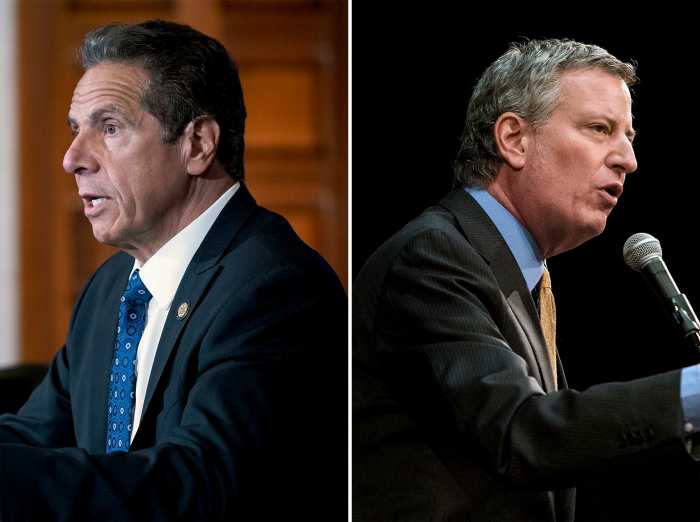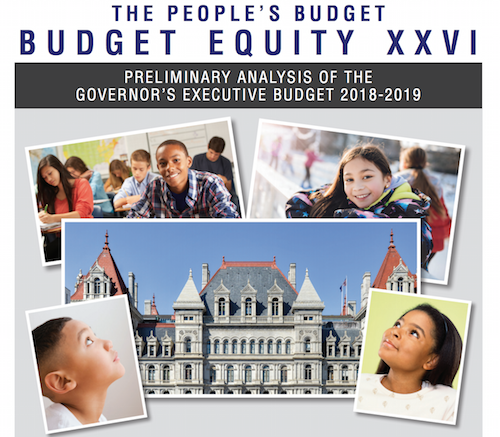As coronavirus continues to spread to every county in the state, Governor Andrew Cuomo and state legislature yesterday hammered out a final $177 billion Fiscal Year 2020-21 state budget.
Besides dealing with the COVID pandemic, the budget negotiations also had to deal with a $6 billion deficit in January. The spending plan is about $2 billion over last year’s fiscal year budget of $175 billion.

“They said we have a lot of needs. There’s a lot of issues that need to be addressed. And they stepped up to the plate and they did it,” said Cuomo in a press conference yesterday about Assembly Speaker Carl Heastie, State Senate Majority Leader Andrea Stewart-Cousins, and the rest of his colleagues working hard on the budget. “That it was done this year is really extraordinary.”
Key issues that were absolutely decided on included bills on state debt, revenues, aid to localities, public protections, no new taxes; and no marijuana legalization, which was deemed too complicated of an issue to deal with while the state was in crisis.
Miscellaneous health and environmental concerns, such as the sale of flavored e-cigarettes and gender-based pricing discrimination or the “pink tax,” were either addressed or banned. E-bikes and scooters were legalized across the state with the use of a helmet.
Cuomo announced other major city construction projects pre-coronavirus outbreak, like the expansion of Penn Station by a whole city block, seem to be on track.
However, cuts to Medicaid, changes to controversial bail reforms, and freezes to public education funding had state legislators in a bit of a stalemate two days past the budget’s deadline.
Medicaid’s Redesign Team II (MRT II) executive summary stated that the $2.5 billion spending reductions were established before the outbreak of COVID-19, on February 4, with the goal of creating a sustainable Medicaid program.
Revisions in March built on these plans while trying to account for the public health emergency. The summary outlines resources dedicated to stopping COVID-19, and it is expected that “federal disaster funding that includes enhanced Medicaid support will support the modification of these reforms.”
New York State Budget Director Robert Mujica said in the press conference that many of the MRT II recommendations are in the budget, but the effective dates can be delayed if needed. In a press release from the governor’s office, Medicaid spending is supposed to increase by about $500 million.
Bail reform and rollbacks continue to inspire a wide range of passionate opinions, especially from low-income and Black community activists.

Public Advocate Jumaane D. Williams said legislators blurred the budget and insisted that Albany legislators had the opportunity to reject a terrible financing system but pushed it through, despite rejection by the courts and broad opposition from progressives and conservatives.
“There is also opposition on the left and right to Albany’s continued push to claw back the progress made on bail reform in the budget, to put more New Yorkers behind bars and continue a history of over-incarceration and bias in our system,” said Williams.
“It is unconscionable that Albany played politics with the lives of tens of thousands of New Yorkers,” said Katie Schaffer, Director of Advocacy and Organizing at Center for Community Alternatives in response to the passage of bail reform rollbacks in the Senate.
Towards the end of the press conference Cuomo briefly addressed the issue of bail reform in the budget. “The bail reform we did last year, I’m very proud of because it was discriminatory in effect and impact,” said Cuomo, “I think the improvements we made this year were the right thing also.”
A host of other crimes were added as part of the budget to the bail eligibility list, like possession of drugs, money laundering, grand larceny, sex trafficking, and other related sex crimes involving children. Judges will continue to not have discretion about who is locked up, but prosecutors will now have more time to turn over evidence to defendants.
In addition to those reforms, funding to help New Yorkers navigate the criminal justice system and create the Josef Neumann Terrorism Act was approved. The act expands the state’s domestic terrorist law to include hate crimes, in response to anti-semitic attacks last year.
It was inspired by the tragic stabbing and passing of Josef Neumann, who was attacked in his home on the final night of Hanukkah.
“This budget provides the funding to help New Yorkers find justice in our state,” said Assemblyman Joseph R. Lentol (D-North Brooklyn).
The budget also put aside $4.2 million to support legal services for domestic violence victims, veterans, immigrants, prisoners, and $600,000 for the low-income parolee program, according to Lentol.
As far as education goes, according to City & State NY, one controversial bill dealing primarily with education was introduced Thursday morning. The bill would cut $400 million to the state budget, but anticipated the federal government offsetting that with $1.3 billion in funding for schools.
The governor’s office stated that “support for schools will remain nearly flat for a total of $27.9 billion in school aid” The fiscal year budget will also make $213 million available for colleges, higher education, and training centers; and make room for more low-income college students to have access to SNAP benefits.
Lastly, the budget authorizes a reduction in spending by $10 billion to account for the COVID-19 pandemic ravaging the city and state economies. Rolling budget cuts throughout the year will also be implemented to maintain the tenuous balance of the budget.










